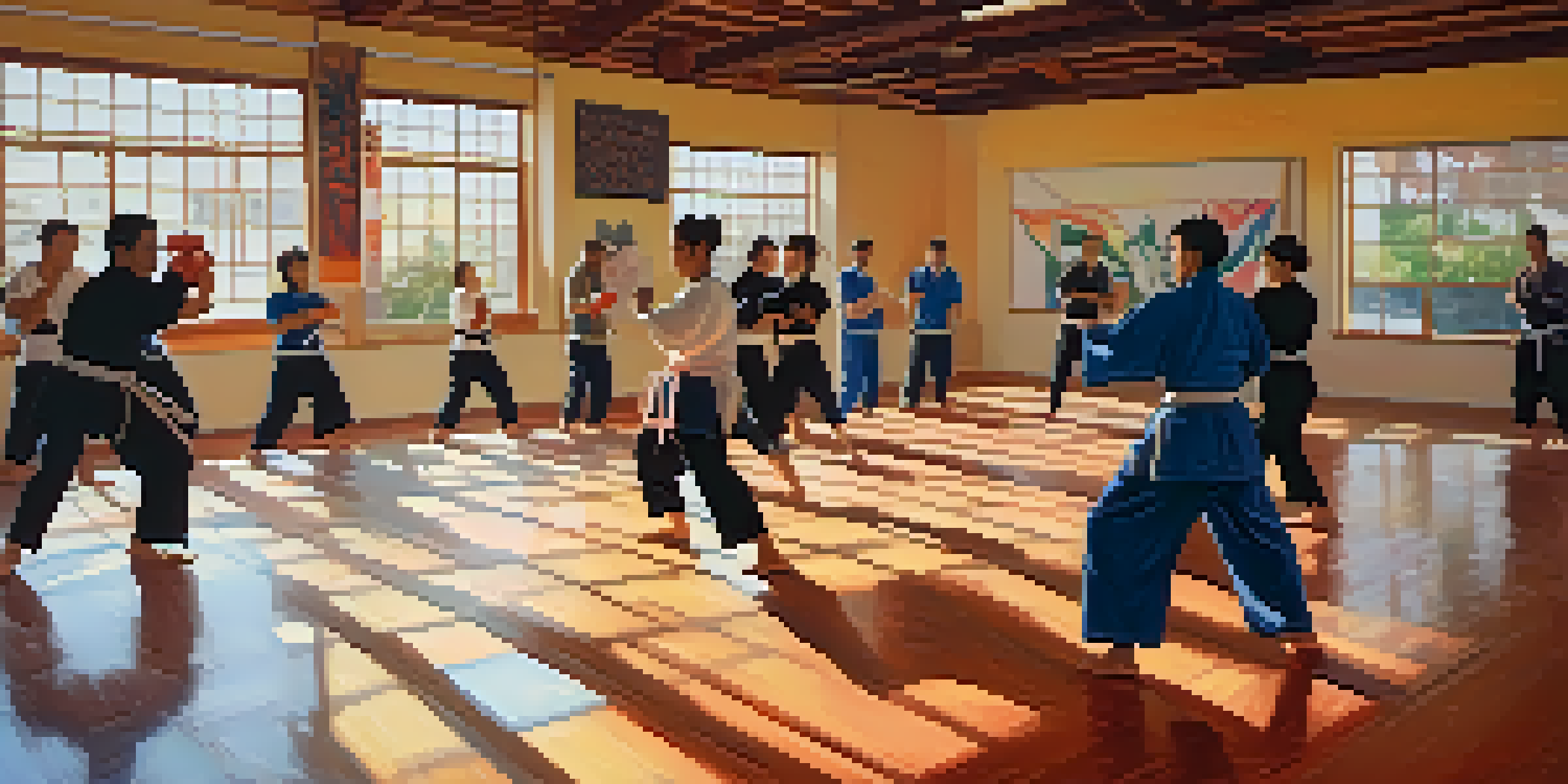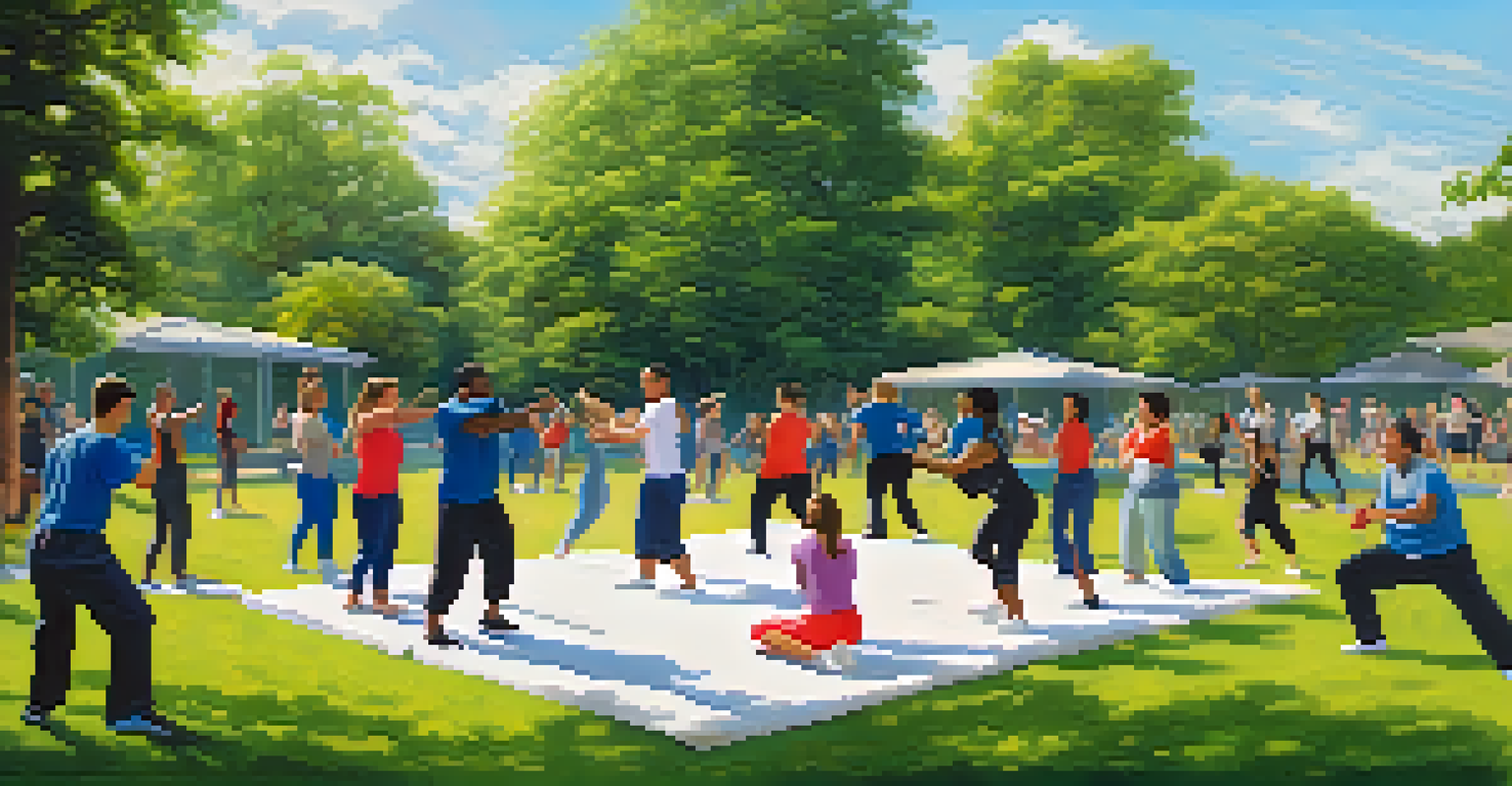The Role of Self Defense in Cultivating Confidence and Resilience

Understanding Self Defense and Its Importance
Self defense encompasses a variety of techniques and practices aimed at protecting oneself from harm. It is not just about physical skills; it also involves mental preparedness and awareness of one’s surroundings. By learning self defense, individuals equip themselves with the knowledge to handle dangerous situations calmly and effectively.
Self-defense is not just a set of techniques; it's a mindset that empowers individuals to take control of their safety and well-being.
The importance of self defense extends beyond just the physical aspect. It instills a sense of empowerment, allowing individuals to feel more in control of their safety. This newfound control can dramatically shift one’s mindset, encouraging proactive rather than reactive behavior in daily life.
Moreover, self defense training can serve as an entry point into broader discussions about personal safety and mental health. By recognizing the significance of self defense, individuals open themselves up to a journey of self-discovery and resilience-building.
Building Confidence Through Self Defense Training
Confidence is often built through experience, and self defense training provides a structured environment to practice and hone skills. Each lesson learned and technique mastered contributes to a growing sense of self-assurance. When students realize they can effectively defend themselves, their confidence naturally flourishes.

Additionally, the act of overcoming challenges during training—like mastering a difficult move or sparring with a partner—fosters resilience. Participants learn to push through discomfort and setbacks, which translates to greater confidence in other areas of life. This process of facing fears head-on is a powerful confidence booster.
Empowerment Through Self Defense
Learning self defense helps individuals reclaim their power and autonomy, leading to greater self-esteem and assertiveness.
As individuals progress in their self defense journey, they often find themselves stepping out of their comfort zones in various aspects of life. This ripple effect of confidence can lead to improved relationships, career advancements, and overall personal growth.
Resilience: The Hidden Benefit of Self Defense
Resilience is the ability to bounce back from challenges, and self defense training is a prime environment for nurturing this trait. When faced with physically demanding drills or high-pressure situations, practitioners learn to maintain composure and adapt. This adaptability is a key component of resilience, preparing individuals for life’s inevitable ups and downs.
The greatest weapon against stress is our ability to choose one thought over another.
Furthermore, encountering and overcoming fears during self defense practice can bolster one’s mental fortitude. By facing fears in a safe setting, individuals build a mental toolkit for handling stress and adversity outside the training environment. This transfer of skills can be invaluable in personal and professional contexts.
Ultimately, the resilience gained from self defense training extends far beyond physical encounters. It equips individuals with the mindset needed to tackle life’s challenges, fostering a stronger, more resilient version of themselves.
The Community Aspect of Self Defense Training
Self defense classes often create a sense of community among participants, which can significantly enhance personal growth. Training together fosters a supportive environment where individuals share their experiences, fears, and triumphs. This communal aspect can further bolster confidence, as members encourage each other to step outside their comfort zones.
Being part of a group with similar goals can also provide accountability, motivating individuals to commit to their training. This accountability helps reinforce the skills learned, leading to greater confidence in applying those skills in real-life situations. The shared journey towards personal safety creates bonds that extend beyond the dojo or training space.
Building Confidence and Resilience
Self defense training fosters confidence and resilience by encouraging individuals to face challenges and push their limits.
Moreover, community support can be a crucial factor in building resilience. Knowing that others are facing similar challenges helps individuals feel less isolated in their experiences, promoting emotional well-being and mutual support.
Self Defense as a Tool for Personal Empowerment
Personal empowerment is about taking control of one’s life, and self defense plays a pivotal role in this process. By learning how to protect oneself, individuals reclaim their power and autonomy, which often translates into other areas of their lives. This sense of empowerment can lead to more assertive decision-making and a greater willingness to take risks.
Self defense training teaches individuals to recognize their own strength and capabilities. This newfound self-awareness can be transformative, leading to increased self-esteem and a more positive self-image. Empowered individuals are more likely to pursue their goals with tenacity and confidence.
In essence, self defense is not just about physical safety; it's about cultivating a mindset that embraces personal power. This empowerment can influence everyday interactions, encouraging individuals to advocate for themselves and others.
Setting Realistic Expectations in Self Defense Training
As with any skill, it's important to set realistic expectations when embarking on a self defense journey. Progress may be gradual, and individuals might encounter challenges along the way. Understanding that mastery takes time can help maintain motivation and prevent frustration.
Moreover, recognizing personal limits while pushing boundaries is crucial. Self defense training should be approached with a mindset of growth, focusing on incremental improvements rather than perfection. This perspective fosters resilience, as individuals learn to appreciate their progress, however small it may seem.
Community Support Enhances Growth
Training in a group creates a supportive environment that enhances personal growth and accountability among participants.
By setting realistic expectations, practitioners can cultivate a sustainable and enjoyable training experience. This positive approach not only enhances confidence but also reinforces the idea that resilience is built over time through consistent effort.
Conclusion: The Lasting Impact of Self Defense
The journey of self defense training is much more than just learning how to defend oneself; it’s a holistic approach to building confidence and resilience. Each class attended, every technique learned, and every challenge faced contributes to a greater sense of self-worth and empowerment. This journey can lead to profound changes in how individuals view themselves and their capabilities.
The skills and mindset developed through self defense training can extend into all areas of life, fostering stronger relationships, professional success, and overall well-being. As individuals learn to navigate physical confrontations, they simultaneously cultivate the inner strength needed to tackle life’s challenges with grace and determination.

In essence, self defense is a powerful tool for personal transformation. Embracing this journey not only enhances physical safety but also nurtures the confidence and resilience needed to thrive in a complex world.